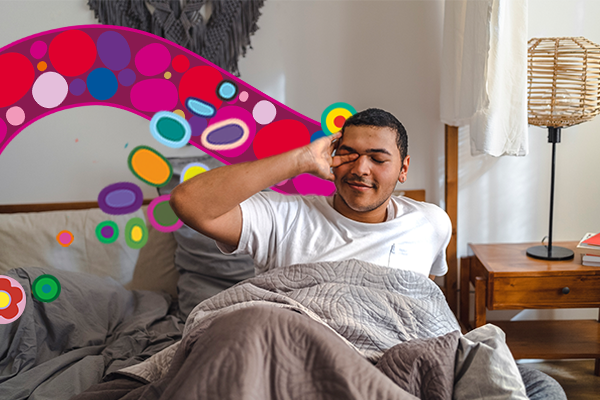How menopause can affect your mental health

Menopause is a natural biological transition, but that doesn’t mean it’s easy. Hormonal shifts and physical changes can take a toll emotionally and mentally, while transitioning to a new life stage can bring up challenging emotions.
You may start to feel less like yourself: more irritable, anxious, scattered or low. These symptoms are real, and you’re far from alone. Understanding what’s happening can help you take control of your mental health during this time of change.
What is menopause and when does it start?
Menopause marks the end of menstruation and the end of a person’s ability to become pregnant naturally. Menopause typically includes three stages, outlined below.
Perimenopause
Perimenopause often begins in the years after a woman turns 40, but it can start earlier or later. There is no ‘right’ time. During this time, hormone levels begin to change and periods may become irregular (lighter or heavier). Symptoms such as mood changes, sleep disruption and brain fog may also appear. Perimenopause can last anywhere from four to ten years.
Menopause
Menopause is 12 months after your last period. In Australia, most women and people who menstruate reach menopause between the ages of 45 and 55.
Post-menopause
This phase describes the time after menopause. Some symptoms may continue, while others will ease over time.
Mental health symptoms during menopause
While physical symptoms like hot flushes, night sweats and fatigue are commonly talked about, the emotional symptoms of menopause can be just as significant.
You may experience:
- feeling sad, low, irritable or angry
- panic attacks
- brain fog
- feelings of grief or loss
- low self-esteem.
Some people may experience only mild symptoms; for others, symptoms may be more intense.
If you’ve previously experienced depression or premenstrual syndrome (PMS), you may have an increased chance of feeling depressed during menopause. Additionally, going through menopause earlier than is typical can make you more likely to experience mental health symptoms during this time.
If symptoms start to affect your daily life, such as your work or relationships, reach out for support, especially if you’ve been experiencing anxious or depressive symptoms for two weeks or more. Your GP is often the best place to start. They will be able to assess your individual situation and recommend the best next steps for treatment or support.

24/7 Medibank Mental Health Support
Medibank health insurance members can chat to a mental health professional about how they feel and ask questions about a range of mental health concerns for themselves or a loved one and get guidance on what they can do next. Chat online or call 1800 644 325 anytime of the day or night, 7 days a week at no extra cost.~
Why menopause affects mental health
There are many reasons why menopause can affect your mental health. Fluctuating hormones can affect your mood, while sleep disruption caused by night sweats or insomnia can also increase your chances of developing depressive symptoms.
Cognitive symptoms, such as forgetfulness and brain fog, can affect your confidence and productivity, while physical symptoms like fatigue and sexual discomfort may affect your relationship with a partner or yourself.
Life stressors, such as career changes or caring for children or ageing parents, are also common during this stage of life and contribute to feeling overwhelmed.
All of this, while challenging, is not unusual to experience during menopause. It’s important to remember that you are not alone and that support is available.
What support and treatment options are available for menopause?
If menopause symptoms are affecting your daily life, speak with a GP who understands the menopause transition. Your doctor should take your concerns seriously and work with you to explore treatment options that suit your needs.
Your GP might recommend medication or menopause hormone therapy (MHT, also known as HRT), depending on your situation. If MHT isn’t suitable for you, your GP may recommend other medications and therapies, such as antidepressants to help with hot flushes, and cognitive behavioural therapy (CBT) or hypnotherapy to manage symptoms like anxiety and sleep issues.
Your GP can guide you through these options and provide referrals if needed.
Can lifestyle changes improve mental health during menopause?
Menopause is a great time to check in on your overall health and consider a few lifestyle changes. While there’s limited evidence that things like diet and exercise directly reduce symptoms such as hot flushes, they can help you cope better and improve your general wellbeing.
Stay active
Staying active and maintaining a healthy weight is especially important. Changes in hormones, reduced muscle mass and shifting habits can all contribute to weight gain, which can make symptoms worse and increase your risk of heart disease, diabetes and other health issues. A balanced diet and regular exercise can help. Aim for a mix of aerobic activity, strength training and flexibility exercises like yoga.
Eat for brain health
Consider eating a Mediterranean-style diet to support your brain health during menopause. It’s rich in antioxidants and focuses on colourful fruits and vegetables, which may help protect and nourish the brain.
Ease your mental workload
If you’re experiencing brain fog or forgetfulness, practical strategies could help ease the burden: keeping a diary, making lists or using calendar reminders can support your memory and reduce stress. Also, consider whether you are carrying a heavy cognitive load, such as managing family or household tasks, and if possible, share some responsibilities to lighten your mental workload.
Remember, managing menopause is not about pushing through alone. Combining practical lifestyle changes with emotional connection and medical support where needed may help you feel healthier, more connected and empowered.
How can I support someone experiencing menopause?
If someone close to you is going through menopause, one of the most helpful things you can do is listen without judgment. Be patient and open to learning about what they’re experiencing, whether it’s mood changes, brain fog or trouble sleeping. Small acts of support, like helping with household tasks or encouraging them to speak with a GP, can make a big difference. It’s also important to avoid minimising their symptoms or suggesting they ‘just get on with it’. Menopause can be a vulnerable time, and feeling heard, understood and supported is important and can help your loved one feel supported.
How can we help?
I want to know how my cover supports mental health
I need help and want to talk
Related articles
Things you need to know
~ Some referred services may involve out of pocket costs and waiting periods may apply.
While we hope you find this information helpful, please note that it is general in nature. It is not health advice, and is not tailored to meet your individual health needs. You should always consult a trusted health professional before making decisions about your health care. While we have prepared the information carefully, we can’t guarantee that it is accurate, complete or up-to-date. And while we may mention goods or services provided by others, we aren’t specifically endorsing them and can’t accept responsibility for them. For these reasons we are unable to accept responsibility for any loss that may be sustained from acting on this information (subject to applicable consumer guarantees).











































